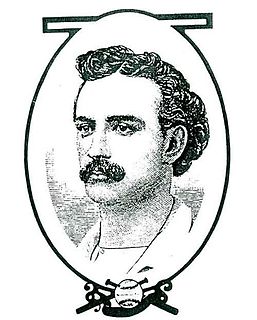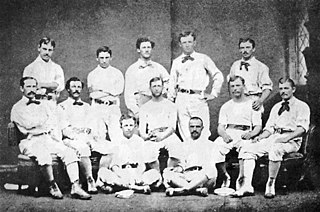
The Baltimore Canaries were a professional baseball club in the National Association from 1872 to 1874.

The Baltimore Canaries were a professional baseball club in the National Association from 1872 to 1874.
The team was usually listed as Lord Baltimore in the box scores of the day, and were also referred to as the Yellow Stockings. [1] The canary and yellow stockings labels were in reference to their uniform colors.
Though visually striking, the club's uniforms were not necessarily universally acclaimed. The Chicago Inter-Ocean reporter, covering a game staged in Chicago on May 29, 1872, described "the Baltimore nine, clad in yellow pants, white shirts, white hats, and ugly looking black and yellow stockings."
The Canaries played their home games at Newington Park in Baltimore, Maryland. Newington Park was located on Pennsylvania Avenue in Baltimore city. They played under five different managers in their three seasons, winning 78 games and losing 79. [2]
The St. Louis Brown Stockings were a professional baseball club based in St. Louis, Missouri, from 1875 to 1877, which competed on the cusps of the existences of two all-professional leagues—the National Association (NA) and the National League (NL). The team is the forerunner of, but not directly connected with, the current St. Louis Cardinals Major League Baseball team. After the conclusion of the 1877 season, a game-fixing scandal involving two players the Brown Stockings had acquired led the team to resign its membership in the NL. The club then declared bankruptcy and folded.
The National Association of Professional Base Ball Players (NAPBBP), often known simply as the National Association (NA), was the first fully-professional sports league in baseball. The NA was founded in 1871 and continued through the 1875 season. It succeeded and incorporated several professional clubs from the previous National Association of Base Ball Players (NABBP) of 1857–1870, sometimes called "the amateur Association". In turn, several NA clubs created the succeeding National League of Professional Baseball Clubs, which joined with the American League of Professional Base Ball Clubs to form Major League Baseball (MLB) in 1903.
The Cincinnati Red Stockings of 1869 were baseball's first openly all-professional team, with ten salaried players. The Cincinnati Base Ball Club formed in 1866 and fielded competitive teams in the National Association of Base Ball Players (NABBP) 1867–1870, a time of a transition that ambitious Cincinnati businessmen and English-born ballplayer Harry Wright shaped as much as anyone. Major League Baseball recognized those events officially by sponsoring a centennial of professional baseball in 1969.

Lipman Emanuel "Lip" Pike the "Iron Batter", was an American who was one of the stars of 19th-century baseball in the United States. His brother, Israel Pike, played briefly for the Hartford Dark Blues during the 1877 season.
23rd Street Grounds, also known as State Street Grounds and 23rd Street Park, and sometimes spelled out as Twenty-third Street Grounds, was a ballpark in Chicago, in what is now the Chinatown district. In this ballpark, the Chicago White Stockings played baseball from 1874 to 1877, the first two years in the National Association and the latter two in the National League.
Union Base-Ball Grounds was a baseball park located in Chicago. The park was "very visibly downtown", its small block bounded on the west by Michigan Avenue, on the north by Randolph Street, and on the east by railroad tracks and the lake shore, which was then much closer than it is today. The site is now part of Millennium Park.

The Athletic Base Ball Club of Philadelphia was a prominent National Association, and later National League, professional baseball team that played in the second half of the 19th century.

George William Hall was a professional baseball player who played in the National Association and later the National League. Born in Stepney, England, Hall later immigrated to the U.S. He made his professional debut on May 5, 1871.

Robert Vavasour Ferguson was an American infielder, league official, manager and umpire in the early days of baseball, playing both before and after baseball became a professional sport. In addition to playing and managing, he served as president of the National Association of Professional Base Ball Players from 1872 through 1875, the sport's first entirely professional league. His character and unquestioned honesty were highly regarded during a period in baseball history where the game's reputation was badly damaged by gamblers and rowdy behavior by players and fans. However, his bad temper and stubbornness were traits that created trouble for him at times during his career, and caused him to be disliked by many. His nickname, "Death to Flying Things", was derived from his greatness as a defensive player.
The following are the baseball events of the year 1881 throughout the world.
The following are the baseball events of the year 1875 throughout the world.

David W. "Davy" Force was a shortstop in Major League Baseball. From 1871 through 1886, he played in the National Association with the Washington Olympics (1871), Troy Haymakers (1872), Baltimore Canaries (1872[end]-1873), Chicago White Stockings (1874) and Philadelphia Athletics (1875), and in the National League for the Philadelphia Athletics (1876), New York Mutuals (1876), St. Louis Brown Stockings (1877), Buffalo Bisons (1879–1885) and Washington Nationals (1886). Force batted and threw right-handed.
The Chicago Browns/Pittsburgh Stogies were a short-lived professional baseball team in the Union Association of 1884. They were to battle the Chicago White Stockings, of the National League, for the Chicago baseball market; however, the Browns lost that battle to the White Stockings. After a Baltimore mattress maker gave the club a degree of financial support, the Browns then tried to entice the White Stockings' Larry Corcoran, one of the 1880s top pitchers, to join the team. However, the club did not succeed in doing so. The Chicago Browns disbanded after a game on August 22, 1884. The club then moved to Pittsburgh and became the Stogies, which disbanded after a game played on September 18, 1884. Many of the club's players then joined the Baltimore Monumentals. Altogether, they won 41 games, lost 50, and tied 2, finishing sixth in the twelve-team league.
The St. Louis Red Stockings were a professional baseball team in the National Association of Professional Base Ball Players for the 1875 season.
The Washington Nationals were the first important baseball club in the nation's capital. They played part of one season or parts of two seasons in the National Association, the first professional league, so they are considered a major league team by those who count the NA as a major league. Several baseball clubs in Washington have used the historic name Nationals.
John Young Radcliff was an American professional baseball player who played for the Philadelphia Athletics (1871), Baltimore Canaries (1872–1873), Philadelphia Whites (1874), and Philadelphia Centennials (1875). He was primarily a shortstop.

Winfield Scott Hastings was a major league baseball player and manager in the late 19th century. Primarily a catcher and outfielder, Hastings also appeared as a first baseman, second baseman, and shortstop over the course of his career.
This is a summary of the evolution of names of the current professional Major League Baseball teams in the National League and subsequent rival American League, and also of selected former major and minor league teams whose names were influential, long-lasting, or both. The sources of the names included club names, team colors, and city symbols. The names have sometimes been dubbed by the media, other times through conscious advertising marketing by the team, or sometimes a little of both.

Charles Hodes was an American professional baseball player who played as a catcher, infielder, and outfielder in the National Association for three seasons from 1871 to 1874. A Brooklyn native, Hodes played one season each for the Chicago White Stockings, Troy Haymakers, and Brooklyn Atlantics. He had a career batting average of .231 in 63 total games before dying from tuberculosis in 1875.
The St. Louis Cardinals, a professional baseball franchise based in St. Louis, Missouri, compete in the National League (NL) of Major League Baseball (MLB). As the game of baseball garnered interest in the United States in the 19th century, professional baseball in St. Louis became rooted chiefly in one disestablished Major League club – named the Brown Stockings, the same as the Cardinals' earliest name – which is loosely connected, but does not fall within the scope of, today's Cardinals. The Brown Stockings became St. Louis' first fully professional baseball club when they gained accession in the National Association (NA) in 1875. However, the NA folded after that season. That winter, with five other former NA teams, St. Louis established a new, eight-team league called the National League (NL) and began play the next season. Despite early success, Brown Stocking players were found to be connected to game fixing scandals, which forced bankruptcy and the club's expulsion from the NL. This scandal also abrogated their professional status but some members maintained play as a semi-professional team, primarily operated by outfielder Ned Cuthbert, until 1881.